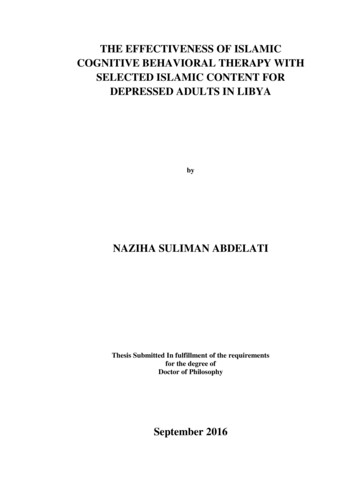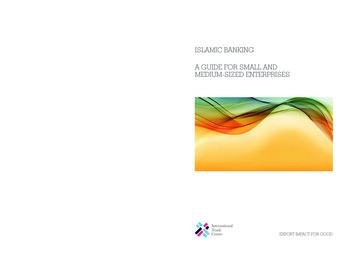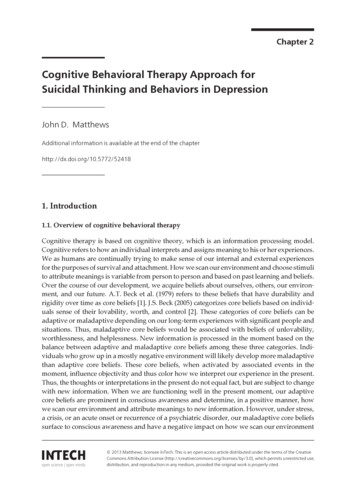
Transcription
THE EFFECTIVENESS OF ISLAMICCOGNITIVE BEHAVIORAL THERAPY WITHSELECTED ISLAMIC CONTENT FORDEPRESSED ADULTS IN LIBYAbyNAZIHA SULIMAN ABDELATIThesis Submitted In fulfillment of the requirementsfor the degree ofDoctor of PhilosophySeptember 2016
ACKNOWLEDGEMENTIn the Name of Allah, the Most Beneficent, the Most Merciful. All the praisesand thanks be to Allah. Completing a dissertation, though rewarding in many ways, is avery challenging and thorny endeavour. To do so, I needed to overcome many obstaclesthat I did not imagine I would face. The support, love, and encouragement of so manypeople were, therefore, vital to its completion.First, I would like to express my most sincere gratitude to my mentor andadvisor, Dr Norzarina Mohd Zaharim whose true support, professional guidance, realcommitment, incomparable knowledge, and exceptional wisdom were essential to thecompletion of this project. She’s one of Allah’s blessings to me. Special sincere thanksare also extended to statistician Dr Khadija Saeed for her support and helpfulsuggestions through the data analysis.Further, this study could not have been concluded without the deep love and thereal commitment, support, and patience of my beloved husband Salem Arbi, my lovelyson Mohammad and daughters Lien and Alla, and friends Abeer Mohamed, YasminOthman and Najla Wajdei. I am pleased to extend my thanks and gratitude toUniversiti, Universiti Gur Yunies and All the paricipants.I am always deeply obliged to my parents (Suliman Ali Abd Elati and ZinabSatie), my brother Mohammed and my sisters, for their continuous back-up and support.I will never forget their religious support, continuous prayers and doa to Allah for help.ii
TABLE OF CONTENTSACKNOWLEDGEMENTiiTABLE OF CONTENTSiiiLIST OF TABLESxiLIST OF ER ONE: INTRODUCTION1.1 Depression as a Serious Problem11.2 Depression in Libya21.3 Cognitive Behavioral Therapy for Depression41.4 Islam and Cognitive Behavioral Therapy51.5 Statement of the Problem71.6Significance of the Study111.7Objectives of the Study121.7.1 General Objective121.7.2 Specific Objectives131.8 Definition of Terms14iii
CHAPTER TWO: LITERATURE REVIEW2.0 Introduction162.1 Conceptions of Depression162.2 Prevalence of Depression182.3 Etiology of Depression212.3.1Biological Factors212.3.2Psycho-Social Factors222.3.3Medical Disorder Factors242.4 Psychological Theories of Depression2.4.125Psychodynamic-Psychoanalytic Theories252.4.1(a) Psychodynamic Theories262.4.1(b) Psychoanalytic Theories282.4.2Animal Models of Depression312.4.3Existential Theories332.4.4Interpersonal Theory332.4.5Cognitive Theory352.4.6Behavioral Theories392.4.7Cognitive Behavior Theory412.4.8Islamic Theory of Depression432.4.8(a)Major Causes of Depressive Mood432.4.8(b) Minor Causes of Depressive Mood452.4.8(c)Depression Symptoms in the Qur’aniv48
2.5 Diagnosis of Depression512.6 Measuring Depression542.6.1Self-Report Instruments542.6.2Interviewer Rating Instruments582.6.3Summary592.7 Psycho-Treatment Methods for Depression602.7.1Psychodynamic Psychotherapy612.7.2Psychoanalytic Therapy612.7.3Interpersonal Psychotherapy632.7.4Existential Therapy642.7.5Cognitive Therapy652.7.6Behavior Therapy682.7.7Cognitive Behavior Therapy Concepts and Approaches702.7.7(a)73Major Therapeutic Techniques andInterventions of Behavior Therapy2.7.7(b) Evidence for the Effectiveness of CBT for76Depression2.8Islamic Cognitive Behavioral Therapy852.9Summary942.10 Conceptual Framework952.11 Research Hypotheses96v
CHAPTER THREE: METHODOLOGY3.0 Introduction973.1 Population of the Study973.2 Selection of the Participants983.3 Design of the Study1023.4 Instruments1043.4.1Demographic Questionnaire1053.4.2Beck Depression Inventory (BDI-II)1053.5 Procedures1073.5.1Phase I1073.5.2Phase II1083.6 The Design of Intervention1093.6.1 Therapy Protocol of CBT and CBT-IP1093.6.2 CBT and CBT-IP Techniques1143.6.2(a)Phase One of CBT and CBT-IP: Assessment1163.6.2(b)Phase Two of CBT and CBT-IP: Therapy116Formulation3.6.2(c)Phase Three of CBT and CBT-IP: The121Interventions3.7 The Design of Cognitive Behavioral Therapy Islamic principles133(CBT-IPT)3.7. 1 Goals of CBT-IP133vi
3.7.2CBT-IP Principles1343.7. 3Techniques of Integrating CBT-IP with CBT1353.7. 4CBT-IP Strategies1363.7.4(a) Coping Strategies3.7.4)a)(i)Self-Revelation1371383.7.4(b) Behavioral Intervention1393.7.4.2(b)(i)Focusing on the iii)Time Management from an141Islamic Perspective3.7.4(c)Cognitive Intervention1453.7.4 (c)(i)Scope Restriction1453.7.4 (c)(ii)Contentment and Self-1463.7.4 (c)(iii)Satisfaction3.7.4 (c)(iv)Having Good Opinions of148Allah3.7.4 (c)( v)Estimating Worse Situations1493.7.4 (c)(vi)Comparative Analysis1503.7.4 (c)(vii)Optimistic Training1513.7.4 (c)(viii)Being Alert to and Handling152the Satanic Insinuation3.7.4(c)(ix)viiSpiritual Progress153
3.7.4 (c)(x)Faith in Allah and Individual’s155Destiny3.7.4(c)(xi)Islamic Ethics and Etiquette1573.8 CBT and CBT-IP Integration1583.9 Pilot Study161CHAPTER FOUR: RESULTS4.0 Introduction1684.1 Demographic Background of the Participants1684.2 Homogeneity between the Psychotherapy Groups1704.3 Data Analysis1774.3.1 Hypothesis 1: There is a Significant Mean Difference in177Depression between Males and Females4.3.2 Hypothesis 2: There is a Significant Relationship between178Age and Level of Depression4.3.3 Hypothesis 3: There is a Significant Effect of Age on179Depression for Males and Females4.3.4 Hypothesis4: There is a Significant Mean Difference in180Depression Before and After ICBT forParticipants in the Experimental Group4.3.5 Hypothesis 5: There is a Significant Mean Difference inDepression Before and After CBT forviii181
Participants in the Control Group4.3.6 Hypothesis 6: There is No Significant Mean Difference in181Depression Before And After the Experimentfor Participants in the Waiting List Group4.3.7HypoHypothesis 7: There are Significant Mean Differences182Depression between the ExperimentalGroup, Control Group and Waiting ListGroup after Being Exposed to theInterventions4.4Evaluation of the Protocol Compliance in CBT-IP and184CBT (Analysis of Qualitative Data)CHAPTER FIVE: DISCUSSION5.0 Introduction1905.1 Prevalence of Depression1905.25.1.1 Depression and Gender1915.1.2 Depression and Age1935.1.3 Effect of Age and Sex on Depression1955.1.4 Effect of CBT-IP on Depression1965.1.5Effect of CBT on Depression1985.1.6 Depression in the Waiting List Group1995.1.7 Depression across Groups200The Effectiveness of Therapyix206
5.3 Theoretical Implications2095.4 Practical Implications2125.5 Limitations and Future Directions2155.5 Conclusion217REFERENCES218APPENDIXES211x
LIST OF TABLESPageTable 1.1Rates of Depression in Islamic Countries9Table 2.1DSM-IV Criteria53Table 2.2DSM-IV-TR Diagnostic Criteria for Depressive Disorder for Severity/54Psychotic/ Remission Specifies for Current (or Most Recent) MajorDepressive EpisodeTable 3.1The Total Number of Students in the Eight Colleges of Gar Yunis98Table 3.2Selection of the Participants from Colleges of Gar Yunis University99Table 3.3Selection of the Participants from Departments of National Electric100CompanyTable 3.4A Comparison between CBT and CBT-IP159Table 3.5Therapy Design of CBT and CBT-IP160Table 4.1.The Survey and Psychotherapy Groups by Gender169Table 4.2The Survey and Psychotherapy Groups by Age170Table 4.3The Participants’ Marital Status171Table 4.4The Participants’ Education Level172Table 4.5Percentage of Depression Severity among Participants by Age175Table 4.6Frequency of Depression by Gender176xi
LIST OF FIGURESPageFigure 2.1Conceptual Framework95Figure 3.1A Matched Subject Design of the Experiment104Figure 3.2Therapy formulation117Figure 3.3Activity Monitoring Sheet123Figure 3.4A Detailed Thought Record Sheet126Figure 3.5Thoughts Evaluation Sheet129Figure 4.1Percentages of Males and Females in the Survey and169Psychotherapy SamplesFigure4.2Age Groups of the Survey and Psychotherapy Samples170Figure 4.3The Participants’ Marital Status172Figure 4.4The Participants by Education Level173Figure 4.5Depression among participants by marital status176Figure 4.6Correlations between age and depression178Figure 4.7Effect of age on depression for males and females180Figure 4.8Depression Scores After The Therapy groups were exposed to the183interventionxii
APPENDIXESAppendix A:Demographic QuestionnaireAppendix B:Demographic Questionnaire (Arabic Version)Appendix C:Beck Depression InventoryAppendix D:Beck Depression Inventory (Arabic Version)Appendix E:Training CertificateAppendix F:Certificate of Field SupervisorAppendix G:Certificate of Data Collection 1Appendix H:Certificate of Data Collection 2LIST OF PUBLICATIONSxiii
KEBERKESANAN TERAPI KOGNITIF-TINGKAH LAKUDENGAN KANDUNGAN ISLAMIK TERPILIH UNTUK ORANGDEWASA MURUNG DI LIBYAABSTRAKTujuan utama penyelidikan ini adalah untuk mendesain model kognitif tingkahlaku Islam yang terdiri daripada teori Islam tentang kemurungan dan terapi kognitifIslam (CBT-IP) dan menyelidik keberkesanan CBT-IP dalam merawat golongan dewasayang mengalami kemurungan. Data kajian ini dikumpul di Benghazi, bandar keduaterbesar di Libya. Peserta kajian dipilih secara rawak dari Universiti Gar Yunis dansyarikat elektrik kebangsaan. Beck Depression Inventory (BDI-II) dan soalan demografitelah diedarkan kepada 449 orang peserta. Selain itu, BDI-II juga telah digunakanterhadap 75 orang peserta (pesakit dalam dan luar) yang telah dikenalpasti mengalamikemurungan. Pengumpulan data melibatkan dua fasa iaitu survei yang menggunakanborang soal selidik dan psikoterapi untuk individu yang mengalami kemurungan. Kajianini menggunakan kaedah kuantitatif dan kualitatif di mana penyelidik menjalankansurvei dan eksperimen. Untuk bahagian kualitatif, penyelidik menganalisis pelbagai isikandungan sesi, seperti pematuhan tugasan, reaksi klien terhadap intervensi, daninteraksi antara ahli terapi dengan klien. Eksperimen pula menggunakan dua jenis terapikognitif tingkah laku (CBT), iaitu terapi dengan kandungan agama (CBT-IP; 25 orangpeserta) serta terapi dengan protokol standard (CBT; 25 orang peserta) untukmengurangkan kemurungan. Sekumpulan peserta yang terdiri daripada 25 orangxiv
individu yang mengalami kemurungan berada dalam senarai menunggu giliran dan tidakmenerima terapi. Dapatan kajian ini menunjukkan bahawa peratus kemurungan dalamkalangan orang Libya adalah sangat tinggi iaitu sebanyak 68.8% terutamanya dalamkalangan golongan muda dan wanita. Sebanyak 60.8% wanita didapati murung dan usiamempunyai kesan signifikan terhadap kemurungan, terutamanya bagi kumpulan umur17-29 tahun. Dapatan kajian juga menunjukkan bahawa CBT-IP lebih efektif dalammengurangkan kemurungan berbanding CBT dan tanpa terapi (menunggu giliran).Akhirnya, data kualitatif pula menunjukkan bahawa peserta CBT-IP memberikan responyang baik terhadap terapi dan mempunyai kadar penyelesaian tugasan yang tinggi,menggunakan banyak sokongan kerohanian, dan mempunyai interaksi yang baik denganahli terapi. Dapatan kajian ini mempunyai beberapa implikasi. Pertama, dapatan kajianini menunjukkan bahawa kemurungan lebih kerap berlaku dalam kalangan golonganmuda dan wanita. Kedua, perlindungan kesihatan mental wanita bukan hanya cabarankepada bidang perubatan tetapi juga budaya. Ketiga, kajian ini membuktikankepentingan agama dalam merawat simptom kemurungan. Akhirnya, kajian inimemberikan beberapa panduan untuk memasukkan komponen agama dan kerohaniandalam intrevensi psikososial untuk kemurungan.xv
THE EFFECTIVENESS OF ISLAMIC COGNITIVE BEHAVIORALTHERAPY WITH SELECTED ISLAMIC CONTENT FORDEPRESSED ADULTS IN LIBYAABSTRACTThe main purpose of this study was to design an Islamic cognitivebehavioral model that comprises an Islamic theory of depression and Islamiccognitive behavioral therapy (CBT-IP) and examine the effectiveness of CBT-IPin treating depressed adults. Data for the current study were obtained fromBenghazi, the second largest city in Libya. The participants were selectedrandomly from two places: Gar Yunis University and the national anddemographicquestionnaire were administered to 449 participants. Furthermore, 75 depressedindividuals were randomly selected from the survey sample they had already beendiagnosed with primary depression by BDI-II. Data collection involved twophases: a survey that used questionnaires and an intervention (psychotherapy) fordepressed people. This research study used both qualitative and quantitativeapproaches with the researcher conducting a survey and an experiment. For thequalitative portion, the researcher analysed various contents of the sessions, suchas homework compliance, clients’ reaction to the intervention and the interactionbetween the therapist and clients. The experiment used two types of cognitivebehavioral therapy (CBT): one with religious content (CBT-IP; 25 participants)xvi
and another with standard protocol (CBT; 25 people) to reduce depression. Agroup of participants (25 depressed people) were in the waiting list and receivedno therapy. The findings of the present study reveal that the prevalence ofdepression among the Libyan population was very high at 68.8%, especiallyamong young adults and females. 60.8% of females were depressed and there wasa significant effect of age on depression, particularly for the 18-29 age group. Thefindings also show that CBT-IP was significantly more effective in reducingdepression than CBT and no therapy (waiting list). Finally, the qualitative datashowed that CBT-IP participants had good responses to the therapy and a highhomework completion rate, used spiritual support a lot, and had good interactionwith the therapist.xvii
CHAPTER ONEINTRODUCTION1.1Depression as a Serious ProblemDepression is a mood disorder that “can vary in severity from afluctuation in normal mood to an extreme feeling of sadness, pessimism, anddespondency” (VandenBos, 2007). Depression is considered one of the majorpsychological problems in the world. It is the most common disorder,accounting for approximately 50% of psychiatric cases. Millions of patientssuffering from some form of this disorder crowd the psychiatric and generalhospitals (Clark, Beck & Alford, 2009; Sanders, 2003; Zauszniewski &Graham, 2009; Stewart & Chambless, 2009; Segal, Williams, & Teasdale ,2013). In a recent World Health Organization project for the year 2020, it wasestimated that of all diseases, depression will become the second-largestburden of illnesses. At present, it is known to occupy fifth place among thegreatest causes of death (Beck, 1995; Segal, Williams, & Teasdale, 2013). Italso has effects on our society, economy and on the patients’ social life.Depression is known to have negative effects on our society. Forexample, one in every five women experience clinical depression during theirlifetime, whereas among men, the probability is one in ten (Artnur, n.d; Lee &Kim, 2006). In fact, it is a strong irony that people who are depressed, likemost others with mental health problems, are reluctant to seek mental healthtreatment, where only 12% see specialists for their problems. However, each1
year, over 17 million people suffer from depression, of which fewer than 30%get treatment. In addition, depression is the mental disorder with the highestrate of suicide, so it has also been found to be a killer disease: Over 15% ofdepressive people commit suicide and 50% of all suicides have already beendiagnosed as cases of depression (Graham, 2011; Segal, Williams, & Teasdale,2013; Stephen, 2002).Depression is also one of the most common causes of extended workabsence among white-collar employees and is the cause of reduced productivework (Sanders, 2003). It also has a significant negative impact on the economy,costing an estimated 44 billion a year (Segal, Williams, & Teasdale, 2013).The negative effects of depression are not just on the society andeconomy: Depression can interfere with everyday life and frequently causespain to those who have the disorder and also to those who care for them.Serious depression can destroy the life of the family, as well as that of theindividual. It can also affect their studies if they are students (Sanders, 2013).1.2Depression in LibyaLibya is a developing Middle Eastern country of six million people thatis undergoing rapid modernization. The population is highly urbanized: Morethan 85% of the population resides in urban areas. 100% of the population isMuslim. The health-care system is relatively advanced. There are three majorpsychological health service providers under the Ministry of Health (MOH),which provides free-cost services to the population. MOH psychological clinics2
are located throughout the country; 95% of the population can reach theseclinics in 20 minutes or less.Depression may be highly prevalent in Libya. However, up until 2010there were no official statistics. Ali (2008) found a prevalence of depression ofgreater than 30% among 550 randomly selected female and male patientspresenting to primary health-care clinics in Libya. Abu Nasiry (2005) reportedthat depression is highly stigmatized in the Arab world, particularly one thatmay have a heritable component, and often results in extensive efforts to denyor conceal it to preserve the family reputation. The director of the MentalHealth Hospital expressed that the stigma of depression is especially strong forwomen and that even the intimation of mental illness would affect theirprospects for marriage (Ali, 2009).Ali (2008) also found that the treatment of depression varied widely; itwas suggested that many clients sought treatment with private psychiatrists oroutside of the local area because of privacy issues. Treatment of depressionwith medication was also felt to be problematic. As is common in many otherdeveloping countries, patients fearing stigmatization often refuse to go to apsychiatric centre. The director of the Mental Health Hospital reported thatthey used benzodiazepines and anticonvulsants most frequently in treatingdepression (Ali, 2009).Ali (2008) reported that psychotherapy, such as cognitive therapy,behavioral therapy and analytic therapy or counselling, is a limited option inthe treatment of depressed clients in Libya. Further, Islamic principles3
principles psychotherapy has not been used until now. In general, psychiatristsfelt that they did not have the training to counsel patients.“Despite wide acknowledgement of the role of culture in human behavior, thestudy of culture on the practice of psychotherapy in general, and cognitivebehavior therapy (CBT) in particular, has been largely ignored in mainstreampsychology” (Ghassemzadeh, 2007, p. 53). Up until 2010, psychotherapypractice, including CBT, was guided by assumptions that the constructs andprinciples developed in the United States with European-Americans applied toMuslim clients in Libya (Useef, 2010).1.3Cognitive Behavioral Therapy for DepressionThere are many kinds of psychotherapeutic treatments that are aimed athelping individuals to overcome stress, relationship problems, negative habitsand behavior, thought disorder and depression (Beck, 2011). Manypsychological treatments are available for depression, and some have beenshown to be successful and useful, such as cognitive behavioral therapy,interpersonal psychotherapy, psychodynamic psychotherapy and existentialtherapy (Anderson, 2008; Ghassemzadeh, 2007; Huang1, Peng, Chen, & Lu,2009).One of these psychological treatments is cognitive behavioral therapy(CBT). This is a universally classified psychotherapeutic approach which seeksto solve psychological or neurotic disorders, behavior problems concerningdysfunctional emotions, and behavior and cognitions through a goal-oriented4
systematic procedure (Albano & DiBartolo, 2007). The modern CBT wasformed from the integration of cognitive and behavioral therapies.Cognitive behavioral therapy (CBT) for depression is “a form oftreatment aimed at symptoms reduction, through the identification andcorrection of cognitive distortions. These involve negative views of self, one’scurrent world and the future” (DSM-IV-TR, 2004, p. 770). Vital componentsof CBT for depression include a focus on helping clients solve problems;become behaviorally activated; and identify, evaluate, and respond to theirdepressed thinking, especially to negative thinking about themselves, theirworlds, and their future (Beck, 2011). In a nutshell, CBT proposes thatdysfunctional thought (which influence the clients’ mood and behavior) iscommon to depression. When individuals learn to evaluate their thinking in amore realistic and adaptive manner they experience improvement in theiremotional state and in their behavior (Ghassemzadeh, 2007; Pim et al., 2008 &Beck, 2011).1.4Islamic principles and Cognitive Behavioral TherapyOne of the main objectives of the Qur’an when it was revealed ismodifying human behavior, as Allah addressed humans to change theirbehavior. Likewise, the main techniques of cognitive behavioral therapy aim tomodify the behavior of individuals and their feelings by modifying distortedideas. CBT techniques are compatible with Islamic teachings/principles andshould be modified to suit Muslim populations since many Muslims believe in5
the efficacy of faith. Furthermore, the theoretical background of CBT focuseson the clients’ thoughts of “here and now” and is harmonious with the practicesof the Islamic principles religion.Additionally, cognitive behavioral therapy harmonizes with Islamicprinciples in a clear and realistic manner to emphasize thinking. The theory ofcognitive behavioral treatment states that human beings have the ability toguide and improve themselves (Abd Alsatar, 2009). This view is consistentwith an important Islamic principles: “ Surely never will Allah change thecondition of people until they change what is in themselves 1 ” (Qur’an, 13:11).Currently, there is an important need to focus on religion as a means oftreatment for many different types of psychological illness. Most, if not all, thetreatments and counseling approaches used nowadays originated in the Westand thus might not be compatible with Islamic cultures and principles(Hamdan, 2008). In other words, Muslim clients might find a psychotherapythat is compatible with their faith to be more suitable and effective. In fact,many Muslims believe that most serious illnesses could be treated by faith inAllah, enabling the human being to realize that everything, good or bad, comesfrom Allah. This was clarified by Ibn Al-Jawzeeh who reported that true faithopens the door of happiness, goodness and pleasure for the believer (AbdAlstar, 2009).1The researcher used two versions of Quran translation, Yusuf Ali and Muhsin Khan.The italicized words from the Qur’an underline the focus of this study.6
If psychological well-being is the main purpose of psychotherapy, Islamas a religion can offer a suitable solution because it teaches its adherents tostrive for psychological well-being. It can be argued that human beings needfaith to face the challenges in life. In particular, faith is a fundamentalprinciples of Islam and is considered the main factor for psychological wellbeing, relating the human being to the cosmos and Allah, the creator. In thisregard, Allah says: “ for without doubt, in the remembrance of Allah dohearts find satisfaction ” (Qur’an, 13: 28).Finally, CBT-IP aims to benefit from integrates CBT techniques to helpMuslim clients to gain a strength, derived from their surrender to Allah’s will,and a confidence in their ability to recover. This positive power helps reviveclients’ spiritual strength to manage the daily stresses of life. Psychotherapywith Islamic principles appears to be synergistic with widely acceptedprinciples and psychotherapy practices. The key to Psychotherapy with Islamicis a central and overarching focus on spirituality (Ismail, 2008).1.5Statement of the ProblemSeveral findings concluded that there is an urgent need to pay moreattention to psychological disorders (e.g., depression) in Libya and Islamicprinciples countries such as Qatar (Bener, Ghuloum, Abou-Saleh, 2009), SaudiArabia (Alansari, 2006), United Arab Emirate (Ahmadi, Kamel, Ahmed,Bayoumi, 2008) and Pakistan (Husain, Creed, Tomenson, 2000). With regard7
to Libya, Charlson, Steel, Degenhardt, Chey, Silove (2012) estimated thatnearly 50% of Libyans developed depression, while Ali (2008) found that theprevalence of depression was greater than 30%. According to WHO (2001)estimates, one in every four people or 25% of individuals develops one or moremental or behavioral disorders at some stage in life, in both developed anddeveloping countries (Bener, Ghuloum, Abou-Saleh, 2011). It is important tonote that the prevalence of mental disorders in Libyan population is far higherthan the WHO estimate and at the same time it is comparable to the rates foundin some other Islamic principles countries (Charlson, Steel, Degenhardt, Chey,Silove, 2012). Table1.1 shows that depression is high in some Islamiccountries.The Islamic principles world has rich cultures which extend to diversemethods and processes of treating, caring for and supporting Muslims whohave psychological and spiritual problems. Many of these methods andprocesses are found in the Qur’an, the Prophetic Sunnah (sayings and doings)and Muslim jurists’ and scholars’ rulings and ideas. These sources of Islamicprinciples are frequently ignored by therapists when dealing with individualsdisplaying cognitive behavioral difficulties such as depression, anxiety,personality disorder, communicative disorder and so forth. For example, manyIslamic principles teachings, with regard to crisis, frustration, fear, sadness etc.,have been neglected (Abu Raiya, 2009). In this regard Malik Badri (1999) reported on this issue that,one of the problems of the Muslim world today is that it hasbecome dependent on the West in all branches of modernknowledge. Human and social sciences include psychotherapy,8
however, are closely connected with people, and are greatlyaffected by their behavior and relations, and their values andbeliefs. Although some intellectuals claim that thesedisciplines are cross cultural, they have nevertheless becomefundamentally Western in thought and outlook, even inapplication, since they were initiated in the West and cater forthe Western vision of life. This state of affairs represents adanger to the Islamic culture and its spiritual, moral and humanvalues which are left largely unobserved. Muslim psychologistshould therefore take an independent line in the study of thesedisciplines and adopt an attitude of inquiry and criticisminstead of passive acceptance. They should also explore therich cultural heritage of Islam and draw from the extensiveresources introduction available in the Quran, the Sunnah andthe works of the outstanding people of this Ummah. Not onlywill provide ne useful data which can help them solve manyproblems faced in these disciplines but, more importantly, itwill reduce the materialism, fanaticism and narrow mindednessTable 1.1Rates of Depression in Islamic CountriesSampleQatari studentsSaudi rBener, Ghuloum,Abou-Saleh2009Prevalence(%)44·4Bener, Ghuloum,Abou-Saleh201159.4Al-Gelban., et al200738.2Al-Faris., et al201248.2Husain, Creed,TomensonKhan1., et al200044.4200670.0Ahmadi, Kamel,Ahmed, Bayoumi200823.30Ahmed, Banu, AlFageer, Al-Suwaidi200928.69
Additionally, little literature exists in either academic or non-academiccommunities about the suitability of Islamic principles for treating, caring andsupporting individuals who are suffering from depression (Quadri, 2006).Despite the existence of Islamic principles methods and processes for slamicprinciplespsychologists still rely on treatment that lacks Islamic principles perspectives.This could possibly be due to too much respect for, and overdependence on,Western scientific discoveries, even though these Western sciences andfindings are oriented toward non-Islamic principles cultures. This position wasequally recognized by Elias (2005), who asserted that for Muslim helpersworking with a Muslim population, training in religion and spiritualinterventions is a must. This is because, as recognized and believed by manyMuslims, Islam is a way of life which transcends ritual practices.Finally, despite this dramatic increase in the prevalence of depression inLibya, Charlson et al. (2012) reported that “the few trained psychologists andpsychiatrists have no experience of treating depression”. Likewise, Arie (2011)reported that “mental health services were almost non-existent. There are somepsychologists [in the main cities], but they only worked before now on thingslike autism” (p. 423). Based on the foregoing, this research would contribute indeveloping a cognitive behavioral therapy with Islamic principles for Muslimindividuals with depression. Specifically as mentioned above there is a need foran approach or model of psychotherapy that would suit the culture of thepeople in Libya.10
1.6Significance of the StudyThis research is important because it attempts to design CBT withIslamic principles which might be effective and suitable for Muslims withdepression. Similarly, the study would greatly assist therapists, especiallyMuslim therapists, in Psychotherapy with Islamic principles and provides factsabout education and credentialing more religious psychotherapists as well asthe quality and integrity of our training systems which historically have notdone enough to address issues of religion and spirituality in the classroom. Thisstudy is the first attempt to integrate CBT and an Islamic perspective fortreating depressed Muslim individuals. As such, the study could serve as a
2.7.4 Existential Therapy 64 2.7.5 Cognitive Therapy 65 2.7.6 Behavior Therapy 68 2.7.7 Cognitive Behavior Therapy Concepts and Approaches 70 2.7.7(a) Major Therapeutic Techniques and Interventions of Behavior Therapy 73 2.7.7(b) Evidence for the Effectiveness of CBT for Depression 76 2.8 Islamic Cognitive Behavioral Therapy 85










